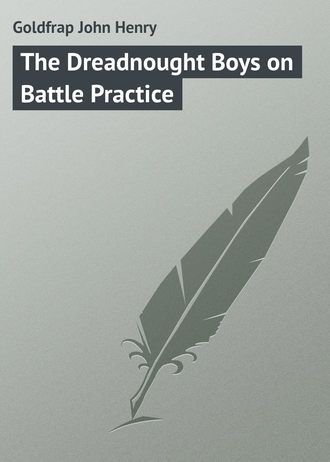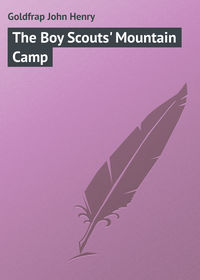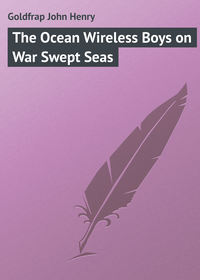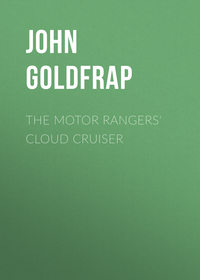 полная версия
полная версияThe Dreadnought Boys on Battle Practice
"If I tell you boys a secret can you keep it – teetotal abstinence?" asked old Tom suddenly.
"You had better not confide in us, if you don't think so," rejoined Ned somewhat sharply.
"Oh, no harm meant," hastily put in Tom; "and at that, it isn't so much of a secret. It's been hinted at in the papers, and maybe you may have heard of it. Have you?"
"Why, how can we tell unless we know what it is?" questioned Ned, with a laugh.
"Well," confided old Tom seriously, and lowering his voice – though by this time the third man on their side of the turret was painting at some distance from them – "well, inside this here turret is one of the new Varian guns. They are the invention of Henry Varian, of Boston – "
"The inventor of that new explosive?" breathed Ned.
"Exactly; Chaosite, they call it. Well, this here gun is specially built to handle this explosive, but it's never been tried yet; and – here's the secret – Varian himself is to join us in Cuba and direct the firing tests of it. While the papers have got hold of the fact that we have the gun on board, none of them know that it is to be tested on this battle practice, or that Varian himself is to meet us at Guantanamo."
"How do you come to know all this?" asked Ned.
"Why, I'm the stroke-oar of the captain's boat – when he uses it – which isn't often, nowadays," lamented old Tom, who hadn't much use for "steamers" and gasoline launches. "Well, when we was at Key West, I rowed him ashore – helped to, that is – and I overheard him talking to this fellow Varian himself about the gun. I wasn't eavesdropping, you understand; just overheard."
"That's mighty interesting," mused Ned; "of course, I have read of the government's experiments with Chaosite. It is supposed to be, I believe, the most powerful of all explosives yet discovered. It's great to think that we are on board the first ship to try it under actual battle conditions."
"I wish we could get on the crew of that gun," put in Herc. "I'd like mighty well to see just how that Chewusite acts when it's touched off. Regular Fourth of July, I guess. Pop-boom-fizz! Up in the air! – stars! – bang – down comes the stick!"
As Herc spoke, in his newly recovered vitality, he swung his pot of slate-colored paint about, to illustrate his meaning. As ill-luck would have it, the wire handle was not oversecurely fastened, and off flew the receptacle of the pigment with which the turret was being covered.
"Oh, crickey! Now I've done it!" groaned Herc, as he felt the bucket slip from the handle and go hurtling down.
The next moment Ned echoed his chum's exclamation of dismay, as he saw what had occurred.
To make matters worse, at that very moment the redoubtable Kennell was passing beneath the turret, on his way aft to clean some brasswork, and had turned his face upward, preparatory to flinging some jeering remark at the two Dreadnought Boys.
The contents of the unlucky pot of paint fell full on his sneering features, blotting them out in a sticky cloud of gray pigment!
CHAPTER XII.
A BULLY GETS A LESSON
For a moment the big form of the paint-covered bully swayed about blindly and helplessly. Then, dashing the paint from his eyes, he emitted a roar like that of a stricken bull.
Jackies at work near at hand, who had seen the accident, gazed at Herc, who had by this time slid to the deck – in a sort of pitying way. They knew Kennell too well to suppose that he would let such an occurrence – even if it were an accident – pass by unrevenged.
"I'm sorry, Kennell; it was an accident," exclaimed Herc, one hand extended, and the other gathering up the loose end of his work-blouse; "here, let me wipe some of it off with this."
He stepped forward, with the intention of doing all he could to repair the damage he had unwittingly caused, but Kennell, with an angry sweep of his arm, waved him furiously back. To increase the bully's rage, some of the men near at hand began to laugh.
"My! what a lovely complexion the kid has when he's all rouged up!" laughed one.
"Kennell's got his battle-paint on," jeered another.
It was easy to see that none of the men particularly regretted the accident to the bully, whom none of them had any particular reason to love.
From their suspended bosn's chairs, Ned and old Tom watched the scene with some apprehensions. Ned was a shrewd enough reader of character to know that the affair could hardly end by Kennell's peaceably accepting Herc's apology; while old Tom knew Kennell's nature too well to entertain any doubt that the young seaman was in for a terrible trouncing.
"You – you – red-headed clod-hopper!" grated Kennell savagely through his mask of "war-paint," when he found his voice. Somehow, he looked so ludicrous, showing his teeth, like a snarling dog, through his panoply of pigment, that Herc, to save his life, could not have restrained himself from bursting into a hearty laugh.
"I – pardon me, Kennell; oh, ha! ha! ha! ha! I – I'm awfully sorry. Please accept my apologies. It was, ha, ha, ha, ha! an accident – really it was. Won't you forgive me?"
Herc held out his hand once more. As he did so, Ned shouted a sharp warning from above.
It came too late.
Kennell's mighty arm shot out with the speed of a piston-rod, and its impact, full on Herc's laughing face, carried the boy crashing against the side rails.
"Take that, you pup, as a starter!" hissed Kennell "and I'm not through with you yet, either. I'll keep after you two whelps till you slink out of the service."
Herc, half-stunned, clambered to his feet, and stood swaying for a moment, as if he were about to keel over altogether. He rapidly pulled himself together, however, and fixed a furious gaze on Kennell, who stood glaring at him with an upcurled lip and narrowed eyes.
Echoing the bellow that Kennell had let forth when the paint obscured his vision temporarily, Herc threw himself into a boxing attitude, and sprang straight for his opponent. It was the onslaught of a wild-cat on a bull.
"Take that, for tripping me overboard, you big coward," he snapped, as he aimed a terrific uppercut at the ship's bully.
The unexpected blow caught Kennell with the force of a young battering-ram. Full on the point of his blunt jaw it landed, and raised him a good foot off the deck. He came crashing down like a felled tree, in a heap at the foot of the turret's barbette.
He lay there, seemingly senseless, while the ship plunged onward, and a thin stream of red began to trickle from his head and spread over the newly whitened deck.
Herc gazed down at his handiwork in consternation.
What if he had killed the man? Kennell lay there so still that it seemed reasonable to suppose that his life might be extinct. The stream of blood, too, alarmed Herc, who had struck out more on impulse than with any well-defined idea of knocking out the ponderous "Kid Kennell."
"Kennell, Kennell!" he breathed, bending over the prostrate man. "Speak! Are you badly hurt?"
"Leave him alone, matey," counseled old Tom, who, with Ned, had slid down from the turret-side. "He's a long way from dead. He's just asleep for a few minutes, and only got what was coming to him."
"Oh, is he all right?" questioned Herc, much relieved.
"Sure; it would take a harder punch than you've got to hurt 'Kid' Kennell seriously," put in a sailor at Herc's elbow; "but Heaven help you when the kid gets about again."
"Why?" asked Herc simply.
"Why? Oh, Lord!" groaned the sailors mirthfully, "why, red-head, he'll pound that ruby-colored head of yours into the middle of next Fourth of July or pink calves'-foot jelly."
"Carry on, men! Carry on!" exclaimed a boatswain's mate, coming round the barbette at this moment.
"Why, what's all this?" he exclaimed the next minute, as his eyes lighted on the recumbent and paint-smeared figure of Kennell, and the flushed faces and anxious eyes of Ned and Herc.
"It's Kennell, sir; he's knocked out," volunteered one of the jackies.
"So I see. Who has so grossly violated the rules of the service as to have been guilty of fighting?"
All eyes rested on poor Herc, who, coloring up to the roots of his colorful thatch, said, in a low voice:
"I have, sir."
Though the lad's tone was low, his voice never quavered.
"What you – Recruit Taylor – fighting?" queried the amazed boatswain's mate, who was no stranger to the record of the redoubtable Kennell, and inwardly marveled at what sort of fighting machine Herc must be to have laid him low.
"Yes, sir; I'm sorry to say that I have," replied Herc, looking his superior straight in the eyes.
At this juncture the officer of the deck hastened up. From his station amidships he had noted the sudden cessation of all activity forward. He had at once hastened to see what had occurred to stop the monotonous clock-work of the routine duties aboard.
"What's all this, Stowe?" he shot out sharply at the boatswain's mate, as his eyes took in the scene.
All the jackies had come to attention as the officer hurried up, but at his sharp command of:
"Carry on, men!" the work had gone forward, apparently as before, although, as my readers will judge, the men had one eye on their work and another on the scene that now transpired.
"Why, as well as I can make out, sir, this young recruit here, sir – Taylor, sir – has been fighting with Kennell, here, sir, and – "
"Seemingly knocked him out," snapped the officer, as Kennell began to stir. He sat up, blinking his eyes like a man who has been summoned back from another world.
As the bully rose, the officer – a young man with a good-natured face – suddenly coughed violently and turned to the rail. His shoulders heaved and his handkerchief was stuffed up to his face.
The boatswain's mate gazed at him apprehensively. He thought his superior had become suddenly ill. As a matter of fact the sight of Kennell's puzzled countenance, blinking through the paint and vital fluid, with which his features were bedaubed, had been too much for the officer's gravity, and he had been compelled to turn away or suffer a severe loss of his dignity by bursting into a roar of laughter.
Finally he recovered himself, and turned, with a still quivering lip, which he bit incessantly, toward the battered Kennell and the others.
"What explanation have you to make of this?" he demanded of Herc, in as unshaken and stern a voice as if he had never suffered the loss of an ounce of his gravity.
Poor Herc saluted and shuffled uneasily from one foot to another.
"Oh, I know he'll make a mess of it," thought Ned to himself. "I wish the regulations would allow me to speak up for him."
"Come, sir; what have you to say?" reiterated the officer, as the sorry-looking Kennell got slowly to his feet. He glowered menacingly at Herc, as recollection of what had occurred began to come back to him.
"Why, sir, that young cur – " Kennell began.
"Silence, sir!" roared the officer; "I'll attend to you when your turn comes."
"I was painting the side of the turret," began Herc; "and, quite by accident, the handle of my painting pail came off. Unfortunately, this man happened to be passing below and the stuff doused him, just like a sheep at dipping time, and – "
"Attention, sir! Never mind your comparisons. Proceed. You have not yet accounted for the extraordinary condition of this man's countenance."
"Why, sir, that's the paint," sputtered Herc, as if astonished at the officer's simplicity.
"Exactly. I understand. You say that such a thing was an accident. Possibly, it was. But how do you account for the fact that the man Kennell was lying insensible at the foot of the turret, with that cut over his eye?"
"I did that, too, sir," admitted Herc ruefully.
"What, you cut his eye like that?"
"No, sir; I guess that he must have done that when he fell. I just gave him a sleep wallop – "
"Attention, sir! Use more respectful intelligible language," said the lieutenant, suddenly becoming much more interested in some object on the far horizon; so much so that he had once more to turn his back on the Dreadnought Boys, the boatswain's mate and the open-mouthed jackies. In a minute he faced round again, as grave as before.
"I hope you are not sea-sick, sir?" began Herc solicitously, for he had observed the officer's handkerchief at his mouth. The lad could not imagine that a scene so serious to him could appear ludicrous to any one else. "If you are, Pills, the doctor, I mean – "
"Silence, sir! You need disciplining. You admit, then, that you hit this man?"
"Yes, sir, but he – "
"Silence! Answer 'yes' or 'no,' please."
"Well, 'yes'," admitted Herc.
"Why in the great horn-spoon doesn't he ask him if Kennell hit him first?" groaned Ned, regarding the examination from a prudent distance.
"This case calls for a full investigation," snapped the officer; "fighting aboard a man-o'-war is one of the most serious offenses an enlisted man can commit. Messenger!"
"Sir!"
"Get the master-at-arms, and request him to come forward and report to me at once."
"Aye, aye, sir!"
The messenger sped aft on his errand, while a dreadful silence ensued, which even the irrepressible Herc had not the courage to break.
Evidently something dire was about to happen to him.
CHAPTER XIII.
HERC LEARNS WHAT "THE BRIG" IS
In a few minutes the messenger returned with the master-at-arms, who saluted the officer of the deck, who in turn gravely saluted him. Herc, feeling that he should do something, saluted each of them in turn, concluding his respectful motions with a deep bow.
Neither officer, however, paid any more attention to the lad than if he had been carved out of wood.
"Master-at-arms!" began the officer.
"Yes, sir," responded the master-at-arms, bringing his heels together with a sharp click.
"There has been a flagrant breach of discipline here, which it is my duty to report to the captain at once. You will place this man, Ordinary Seaman Taylor, under restraint, and arraign him at the mast at one o'clock with the other prisoners."
"Yes, sir," nodded the master-at-arms, edging up to the dismayed Herc.
"Kennell, if you wish to prefer a complaint against this man Taylor, you may," went on the officer.
"I do, sir, certainly," said Kennell earnestly, through the paint that smothered his face; "but first, sir, I should like to clean this mess off, sir."
"You will be relieved from duty while you do. Carry on, men."
The officer of the deck faced about and walked aft; no doubt to acquaint the captain with the details of the occurrences on the forward deck.
"Come, wake up," said the master-at-arms to Herc, who was in a semi-stupor at the horrifying idea that he was under arrest. "Come with me."
"What! I'm to be locked up?" gasped Herc.
"Yes, in the brig."
In an instant the recollection of the boys' conversation with old Tom on the day they joined the ship flashed into Herc's mind. So then "the brig" that the old tar had been so reluctant to talk about, was the place in which they locked up malefactors and disgracers of the service, of whom it seemed he was one. Poor Herc felt ready to drop with shame and humiliation as – under the eyes of the hundreds of jackies going about their various tasks – he was marched aft by the master-at-arms. There was only one drop of relief in his bitter cup. It came when Ned pressed forward, at the risk of being severely reproved.
"Never mind, Herc, old fellow," he breathed. "I know you were in the right, and I'll see that Kennell gets what's coming to him, if it's the last thing I do."
"Come, sir! carry on," snapped the master-at-arms, who had pretended not to notice the first part of this conversation, being a really kind-hearted man, although bound by discipline, just as is every one else in the navy; "you must know it is a breach of discipline to talk to prisoners."
Prisoners!
Poor Herc groaned aloud.
"Come, come," comforted the master-at-arms, "it isn't as bad as all that. I am confident that you can clear yourself. Besides, it is your first offense, and you are a recruit, so perhaps the old man will be easy on you."
"It isn't that, so much as it's the disgrace of being arrested like this," burst out Herc.
"Oh, well, you shouldn't go to fighting, then," remarked the master-at-arms, pulling open a steel-studded door and thrusting Herc before him into a narrow passage, lighted by electric bulbs, down one side of which was fitted a row of steel-barred cells.
"We're a bit crowded," he remarked, "so I can't give you a cell to yourself. When a ship puts to sea out of a port there are generally a lot of men to be disciplined. Those who have overstayed their leave, and so forth. Therefore, I'll have to put you in here."
He opened a door as he spoke, and pushed Herc into a cell in which two other men were already seated on a narrow bench which ran along one side.
"You'll get a full ration at eight bells, for which you are lucky," remarked the master-at-arms; "the others get only bread and water."
Clang!
The steel door swung to, and Herc, for the first time in his life, was a prisoner.
It did not make the experience any the less bitter to know that he was a captive and disgraced through no fault of his own, unless it had been from his exuberant swinging of the paint-pot in the enthusiasm of his newly-acquired "sea-legs."
The Dreadnought Boy, despite his unpleasant situation, was naturally inquisitive enough to gaze about him on his surroundings. The cell itself was a steel-walled apartment about twelve feet square with no other furnishings than the narrow bench, which also was of steel. It was lighted by an electric bulb, set deep in the ceiling and barred off, so that it could not be tampered with by a meddlesome prisoner. The walls of this place were painted white. The floors red. It was insufferably hot and stuffy, and the songs of a group of roisterers confined in another cell, which broke forth as soon as the master-at-arms departed, did not tend to make the environment any pleasanter.
"So this is the brig," mused Herc, "well, they can have it for all I want with it. It's not much better than the hog-pen at home."
One of Herc's fellow prisoners, who had been sitting sullenly on the bench, now arose and began to pace back and forth. His companion did likewise. They had not paid the slightest attention to Herc hitherto, but now one of them spoke.
"What you in for, kid?"
"I guess you'll have to ask the master-at-arms," rejoined Herc, who was not prepossessed by his questioner's appearance. He was a heavy-set, low-browed man, with a pair of black eyebrows that almost met in the center of his forehead, giving him a sinister aspect. His companion was slight, and long-legged, with a delicate – almost an effeminate – cast of features.
"Oh, well, if you don't want to talk you don't have to," growled the heavy-browed man. "Say, Carl," he went on, turning to his companion, "this is a nice, sociable cellmate they've given us, isn't it?"
"You attend to your own affairs, Silas," snarled the other, who did not seem to be any more amiable than his heavy-browed friend; "leave the kid alone. We've got trouble enough of our own, haven't we?"
"Hum, yes; but overstaying leave isn't such a very serious matter, and think of the reward that's ahead in store for us. Only this cruise, and – "
"Hush!" broke in the one addressed as Carl, with an angry intonation; "you must be a fool to talk like that in front of the kid," he went on in a low undertone.
"Pshaw!" snarled the other in the same low voice, however. "He's just a country Reuben, with the hayseed still in his hair and the smell of the hog-pen on him – like that one we gambled with in New York – Hank Harkins – wasn't that his name? – on the old 'Idy'."
"Just the same, it's well to be prudent," counseled the other, and fell once more to his pacing of the cell.
As for Herc, to whom all this, including the reference to Hank, had been, as Carl had guessed, so much Greek, he laid down at full length on the bench. As he had not had more than a few winks of sleep during his seasick night, he soon dropped off into peaceful slumber, despite his uncomfortable couch and serious position.
How long he slept, he did not know, but he woke with a start, and was about to open his eyes, when he suddenly closed them again and feigned deep slumber.
He had heard something being discussed by the two men with whom he shared the cell that set his pulse to stirring and his heart to beating a wild tattoo.
The boy realized that the safety of one of the United States' greatest naval secrets lay, for the time being, in his hands.
CHAPTER XIV.
A PLOT OVERHEARD
"Say, didn't that boy move?" – the prisoner that Herc knew as Carl put the question.
The lad heard rapid footsteps pace across the narrow cell, and felt the hot breath of one of the men in his ear as he lay still and feigned slumber as best he could, although his heart beat so wildly he was sure its agitation must have been audible to the two men.
Apparently, however, his ruse succeeded. The men were satisfied that he was wrapped in slumber, for, with a growl, the one that had bent over him said:
"He's off; sound as a top."
"A good thing," rejoined the other, "both for us and for him."
It was Carl who spoke, and the tone in which his soft, refined voice uttered the words left the Dreadnought Boy no room to doubt that if the two plotters had imagined he had overheard them they would have done something exceedingly unpleasant to prevent their secret being betrayed. As it was, however, they seemed to feel no uneasiness and resumed their conversation.
"The yacht will be waiting at Boco del Toros, about ten miles above Guantanamo Bay," continued the black-browed man. Herc recognized his bearlike growl. "All we have to do when we get the plans is to steal aboard and sail. Her captain will be prepared for us, and will take us on board when we give the signal."
"Then all that we will have to do will be to waylay Varian," said Carl in his soft way, which, mild as it seemed, yet impressed Herc with the same sense of chill as if the cold muzzle of a revolver had been pressed to the nape of his neck.
"That's it. An easy way of earning ten thousand dollars, eh?"
"Yes, if – if we don't get caught."
"No fear of that," laughed the black-browed man; "at any rate, if we are it will be our own fault. But I see no chance of a slip-up. Varian sails from New York to Havana on a vessel of the Ward line. He will put up at a hotel at Guantanamo. We are to meet the others ashore, and if all goes well we'll finish our business in a few hours. If not – "
"Well, if not, we'll have to get what we're after from the captain himself, and that's going to be difficult and perhaps fatal for him."
"Well, I've taken longer chances than that for less money," laughed Carl's companion. "Lucky thing they didn't look back into our records, or they'd have found out a thing or two which would have made us very undesirable subjects for Uncle Sam's navy. Likewise Kennell, I guess. I'd 'a' hard time to get him to join, but a golden bait will catch the shyest fish."
Carl gave a high-pitched chuckle, almost a giggle, but the two worthies instantly lapsed into what seemed sullen silence as the key of their jailer grated in the lock of the bulkhead door.
As for Herc, he judged that his best and safest course was to emit a loud snore, which he did. So well was his slumber simulated that the master-at-arms who had entered, accompanied by two orderlies carrying the prisoners' food, exclaimed in an astonished tone:
"That youngster must be an older hand than I thought him. He's actually sleeping like a baby."
Herc pretended to feel very sleepy when the master-at-arms shook his shoulder and indicated a smoking dinner of cornbeef and cabbage, flanked by bread and butter and a big mug of coffee.
"Here, wake up and eat this," commanded the officer; "you ought to be alive to your luck. The other prisoners only get full rations once a day. They have to dine on bread and water."
The boy stretched his arms as if he was only partially awake, and, after what he judged to be a proper interval of feigning sleepiness, fell to on his hot dinner. Empty as he was, the food heartened him up wonderfully, despite the scowls that his two companions leveled at him as he ate. When the master-at-arms arrived, just before two bells – one o'clock – to take his prisoners to the tribunal at the mast, Sam felt better prepared to face his ordeal than he had a few hours previously.









